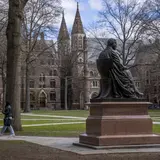Virtual Yale Business Sustainability Summit Commemorates Earth Day
This year’s gathering of CEOs on April 15 explored the evolving role of business sustainability efforts in a discussion marking the 50th anniversary of Earth Day.
By Karen Guzman
On April 15, the Yale Business Sustainability Summit marked the 50th anniversary of Earth Day with a virtual discussion that convened CEOs and corporate sustainability thought leaders to discuss the evolving role of business in addressing society’s sustainability challenges.
Dan Esty, Hillhouse Professor of Environmental Law and Policy, and Jeffrey Sonnenfeld, Lester Crown Professor in the Practice of Management and senior associate dean for leadership studies at the Yale School of Management, hosted the event.
An audience of several hundred viewers attended, including students and professors and business, NGO, and government leaders. A question-and-answer session followed the speakers’ comments. The summit coincided with the eve of the 50th anniversary of the original Earth Day in April 22, 1970, when millions of Americans took to the streets to demand environmental protection, signaling the launch of the modern environmental era in America.
“We want to look back and ask what’s happened over the past 50 years, and then look forward and ask what it’s going to take to move toward a sustainable future,” Esty said.
Sonnenfeld thanked participants for sticking with the summit as COVID-19 forced the event online. “We appreciate your flexibility,” he said.
Sonnenfeld, who was in attendance at the original Earth Day in 1970 in Philadelphia, said that the approach to the environment in the business community has transformed in the decades since. Business leaders greeted the first Earth Day with an “adversarial spirit,” he recalled. “There was a definition of defensiveness.”
By the late 20th century, business leaders came to terms with the need to combat pollution, he said; in the 21st, there has been another evolution: “We now are looking at sustainability and climate issues.”
Speakers included seven leading CEOs, who shared their organizations’ sustainability initiatives, and discussed what they thought needed to be done to ramp up efforts, nationally and globally.
Watch the speakers:
Mike Lamach, CEO of Trane Technologies, noted that the firm’s parent company, Ingersoll Rand, Inc., spun Trane off so that the new company could focus solely on sustainability issues. “I think businesses are filling a gap today, and even stepping in where government isn’t,” Lamach said. “Our purpose at Trane Technology is to boldly challenge what’s possible for a sustainable world.”
Honeywell Chairman and CEO Darius Adamczyk added that the COVID-19 crisis has underscored the need for a healthy future. “It is fitting now, more than ever, that we plan a clean and sustainable world for our children and grandchildren,” he said.
Honeywell is focusing on fostering innovation in five key portfolio areas, Adamcyzk said: hydrofluoric carbon alternatives, supply chain, aviation, renewable fuels, and commercial building.
Several speakers supported the notion of a tax on carbon emissions. “One essential component [of advancing sustainability efforts] is a nationwide price on carbon,” said Ralph Izzo, CEO of Public Service Enterprise Group.
William Nordhaus, Sterling Professor of Economics and professor of forestry and environmental studies at Yale, who is a 2018 Nobel Laureate, agreed, citing carbon pricing, as well as the development of new technologies and continued efforts to educate the public, as critical to success in sustainability.
Doug Sims, senior advisor for green finance and director of the Center for Market Innovation, Natural Resources Defense Council, added that his organization is working on an initiative to phase out the fossil fuel industry by the year 2050. The initiative is a multi-sectoral push, involving banks, companies, and governments, he said.
Kyung-Ah Park, managing director of Goldman Sach’s Environmental Markets Group, said her bank recently targeted $750 million to mobilize capital on climate change and inclusive growth issues. Park said she supports a “holistic perspective of markets coming together” to address climate change.
Retail also plays a big part in addressing sustainability, said Jane Ewing, Walmart’s senior vice president for sustainability and corporate affairs. The mega-retailer has, over decades, created a template through which it addresses sustainability. Its priorities include responsible sourcing, selling sustainable products, restoring natural resources, creating zero waste, and addressing climate change.
“Sustainability is truly embedded in our business,” Ewing said. “It’s part of the culture and rooted in Walmart’s purpose to save people money so that they can live better.”
In all these varied initiatives, organizations need to maintain a “consumer-centric approach, said Ravi Dhar, George Rogers Clark Professor of Management and Marketing and director of the Center for Customer Insights at Yale SOM. Without value creation for consumers, initiatives will ultimately fail in the long run, Dhar said.
Indra Nooyi ’80, retired chair and CEO of PepsiCo, delivered the summit’s closing remarks. She recalled the criticism she received 13 years ago when she launched PepisCo’s companywide “Performance with Purpose” initiative, which incorporated sustainability practices into the company’s strategy.
“What a difference a decade makes,” Nooyi said. “ESG issues are moving from the fringe slowly to the center. Pretty soon I hope investors will begin to look at ESG as quota investing. It’s heartening, indeed.”
Nooyi, who is co-chairing the Reopen Connecticut Advisory Group created by Connecticut Governor Ned Lamont ’80 to make recommendations about the response to COVID-19, said the experience has provided lessons that are applicable to the sustainability campaign.
“COVID-19 has demonstrated the power of global mobilizations to combat looming threats, and lockdowns have given us a glimpse of a less polluted world,” she said.
New public and private partnerships have emerged to combat the crisis, and a period of enforced stillness has given us the “chance to reflect on who we are and what we want to be,” Nooyi said. “We can start laying the foundations for a more sustainable future.”
Watch Nooyi’s remarks:



